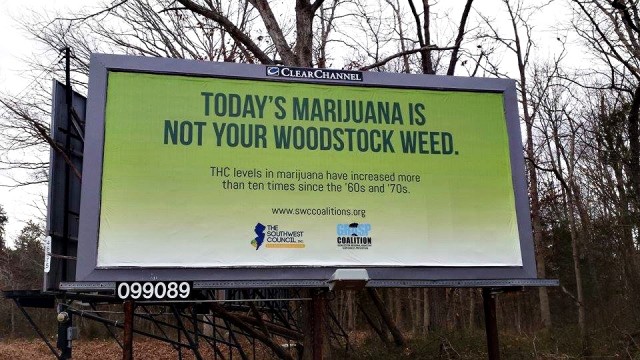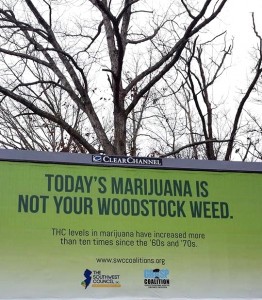 In a state already bogged down by an ignorant governor and a failed medical marijuana program, comes a new anti-cannabis campaign aimed at convincing people that marijuana is a dangerous substance akin to underage drinking and prescription drug abuse.
In a state already bogged down by an ignorant governor and a failed medical marijuana program, comes a new anti-cannabis campaign aimed at convincing people that marijuana is a dangerous substance akin to underage drinking and prescription drug abuse.
The billboards, found in Gloucester County, declare menacingly in big bold text, “Today’s Marijuana is Not Your Woodstock Weed.” Underneath they elaborate, stating that, “THC levels in marijuana have increased more than ten times since the ’60s and ’70s.”
Not only is this an exhausted anti-cannabis trope, but their information is egregiously false. Yes, the cannabis we have today has grown in potency since the ’70s (and we’ll get into why that’s a good thing in a moment), but it hasn’t increased anywhere near as much as they claim.
The United States has been testing marijuana confiscated in raids since 1970 through the Natural Center for Natural Projects Research (NCNPR) at the University of Mississippi. In their research, potency was measured by the amount of psychoactive cannabinoids present in the plants.When today’s cannabis was compared to samples from the 70s, their results showed that while cannabis potency has risen, it has only risen by 57-67%.
This means that at most, cannabis psychoactive levels have increased by less than two times since 1970. Two times is significantly different than the ten times being claimed by this campaign of misinformation.
 Additionally, today’s cannabis users are actually smoking less. Higher THC levels mean users consume less to reach the desired effects. Reports from NIDA support this, saying that joint sizes have dropped from half a gram to a quarter of a gram. So in terms of relativity, a joint smoked in the 70s could be considered equal to a joint smoked today.
Additionally, today’s cannabis users are actually smoking less. Higher THC levels mean users consume less to reach the desired effects. Reports from NIDA support this, saying that joint sizes have dropped from half a gram to a quarter of a gram. So in terms of relativity, a joint smoked in the 70s could be considered equal to a joint smoked today.
Combine this with the cultural shift away from joints and towards heavier use of vaporizers, pipes and bongs, and you have a community of cannabis consumers who are imbibing less often and in a healthier and more effective manner. Of course, this also means that medical marijuana patients can consume less to reach medicinal benefits.
The groups responsible for the campaign are SWC Coalitions, SWCC’s offshoot, GRASP Coalition, and The Southwest Council. The SWC’s homepage states that their mission is to, “reduce the use and abuse of substance in Gloucester County, NJ through prevention education, awareness and advocacy. Our primary focus is on preventing underage drinking, marijuana use, and the abuse of prescription drugs.”
One of these things is not like the other, one of these things just doesn’t belong. Stopping underage drinking is a respectable cause — in the United States alone, alcohol is attributed to the deaths of 88,000 people per year. Prescription drug abuse is also a worthy issue, with drug overdoses steadily rising over the past two decades. Additionally, of the over 40,000 drug overdose deaths reported in 2013, over half (51.8%) were attributed to pharmaceuticals.
Please compare these statistics to the zero recorded deaths from cannabis use in its entire history. Cannabis, even with its increased potency, cannot dream of competing with the legacy of death which alcohol and pharmaceuticals create every single year.
What’s more, GRASP touts their collaboration with none-other than one of the most common prepetrators of misinformation and propaganda — Kevin Sabet. Under ‘Our Accomplishments’ it states that they have, “collaborated with two regional coalitions to organize and host a presentation by Kevin Sabet to increase awareness about the dangers of marijuana. Over 150 individuals attended.”
Without a doubt it is clear that this organization is intent on spreading misinformation and propaganda to the citizens of New Jersey. Truth is not of essence to their blind ‘reefer madness’ agenda against sensible cannabis reform policies.
With campaigns like this and a governor unwilling to listen to the people, New Jersey needs all the help it can get to turn the tide in its embarrassing reputation with cannabis reform.









